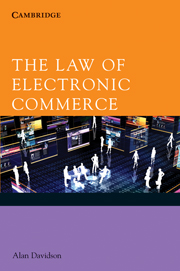Book contents
- Frontmatter
- Contents
- Acknowledgements
- Table of Cases
- Table of statutes
- 1 The law of electronic commerce
- 2 The rule of cyberspace
- 3 Electronic commerce and the law of contract
- 4 Shrinkwrap, clickwrap and browsewrap contracts
- 5 Electronic signatures
- 6 Copyright issues in electronic commerce
- 7 Electronic commerce – trade marks, patents and circuit layouts
- 8 Domain names
- 9 Domain name disputes
- 10 Uniform domain name dispute resolution policies
- 11 Jurisdiction in cyberspace
- 12 Defamation in cyberspace
- 13 Privacy and data protection in cyberspace
- 14 Electronic mail and online presence
- 15 National electronic surveillance
- 16 Cybercrime
- 17 Evidence of electronic records
- 18 Censorship – Broadcast and online content regulation
- 19 An international perspective
- Appendix A Electronic Transactions (Victoria) Act 2000
- Appendix B UNCITRAL Model Law on Electronic Commerce
- Appendix C Selected provisions Copyright Act 1968 (Cth)
- Appendix D ICANN Uniform Dispute Resolution Policy (UDRP)
- Appendix E .au Dispute Resolution Policy (auDRP)
- Appendix F National Privacy Principles
- Index
18 - Censorship – Broadcast and online content regulation
Published online by Cambridge University Press: 05 June 2012
- Frontmatter
- Contents
- Acknowledgements
- Table of Cases
- Table of statutes
- 1 The law of electronic commerce
- 2 The rule of cyberspace
- 3 Electronic commerce and the law of contract
- 4 Shrinkwrap, clickwrap and browsewrap contracts
- 5 Electronic signatures
- 6 Copyright issues in electronic commerce
- 7 Electronic commerce – trade marks, patents and circuit layouts
- 8 Domain names
- 9 Domain name disputes
- 10 Uniform domain name dispute resolution policies
- 11 Jurisdiction in cyberspace
- 12 Defamation in cyberspace
- 13 Privacy and data protection in cyberspace
- 14 Electronic mail and online presence
- 15 National electronic surveillance
- 16 Cybercrime
- 17 Evidence of electronic records
- 18 Censorship – Broadcast and online content regulation
- 19 An international perspective
- Appendix A Electronic Transactions (Victoria) Act 2000
- Appendix B UNCITRAL Model Law on Electronic Commerce
- Appendix C Selected provisions Copyright Act 1968 (Cth)
- Appendix D ICANN Uniform Dispute Resolution Policy (UDRP)
- Appendix E .au Dispute Resolution Policy (auDRP)
- Appendix F National Privacy Principles
- Index
Summary
The Australian Communications and Media Authority (ACMA) is responsible for administering legislation regarding the content and regulation of most forms of electronic communications. This chapter deals with the role of ACMA and the regulation of internet, television and radio communications.
The Australian Communications and Media Authority
On 1 July 2005 ACMA was formed by the merger of the Australian Broadcasting Authority (ABA) and the Australian Communications Authority (ACA). On 1 July 1997 the ACA was formed by the merger of the Australian Telecommunications Authority (AUSTEL) and the Spectrum Management Agency (SMA).
ACMA is responsible for the regulation of broadcasting, radiocommunications, telecommunications and online content. Its responsibilities include:
promoting self-regulation and competition in the telecommunications industry, while protecting consumers and other users;
fostering an environment in which electronic media respect community standards and responds to audience and user needs;
managing access to the radiofrequency spectrum, including the broadcasting services bands;
representing Australia's communications and broadcasting interests internationally.
The internet
ACMA administers the scheme for dealing with content on the internet, enforces Australia's anti-spam law and can make rules about accessing the internet via premium mobile phone services. (The term ‘premium services’ relates to a range of voice and data services that are charged at a premium or high rate. They can include voice services such as chat and dating lines, and internet websites containing adult content. The Minister for Broadband, Communications and the Digital Economy can direct ACMA to make a service provider determination relating to accessing premium services on mobile phones.
- Type
- Chapter
- Information
- The Law of Electronic Commerce , pp. 313 - 329Publisher: Cambridge University PressPrint publication year: 2009



